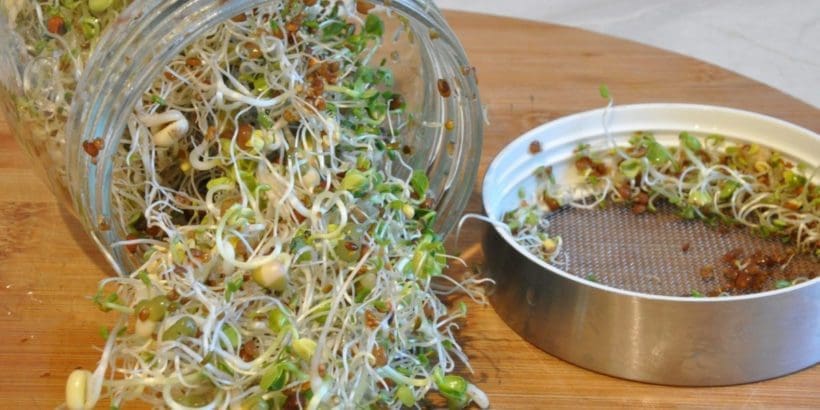There is a simple way to enjoy home-grown salads all year long and that is by growing sprouting seeds. KG editor Steve Ott explains.
With all the food shortages in the supermarkets at the moment and, as I write this, snow falling heavily outside making working in the garden impossible, you might despair of ever being able to have fresh salads again. But in fact there is a very easy way to grow a wide range of highly nutritious and tasty greens with nothing more than a windowsill.
Veggies are often at their most nutritious when harvested very young as seed sprouts, or of you grow them on for a little longer, as microgreens (young seedlings). They have become super popular with restaurants who often use them as a colourful garnish, but deserve to be more widely grown as crops in their own right.
I’ve been doing just that for a long time, but have recently become much more serious about it as a great way to fill any gaps between harvests of full-sized salads grown on the veg patch and to keep us supplied with cheap, healthy food in the winter when nothing is growing outdoors.
If you go online there are many specialists selling seeds and the very simple equipment needed to grow your own seed sprouts, although if you want to cut costs even further you can grow your sprouts in nothing more than a jam jar with a bit of muslin secured over the top with an elastic band. I’ve invested in some purpose-made sprouting jars from www.ukjuicers.com and they do make the whole process very easy. The same company also sells terracotta and other sprouters and a wide range of seeds, but I also shopped around and got more seeds from www.sowseeds.co.uk and there are many more suppliers available.
You can use leftover seeds from your outdoor sowings, but if you do this, make sure they are not treated with any chemicals before you use them and steer clear of tomatoes, aubergines and peppers. Seeds piurchased for the purpose are often organically grown.
Brassicas are good candidates for sprouting, so cabbages, kale, broccoli etc as are onions and some herbs such as chives, garlic chives and fenugreek. Vegetables such as chard, beetroot, radish, mung beans, alfalfa and lentils are also popular, but there are many more to choose from.
The process is very easy and we’ll have lots more detail in a full feature on the topic in KG later in the year, but if you want to try now, simply soak your seeds in clean tap water in your sprouter or jam jar for 12 hours, drain through the lid or muslin, and then rinse and drain twice a day until your seeds are ready. How long this takes depends on the seeds and the temperature, but can be as little as 3-4 days in summer or a week in winter. Then simply rinse, drain and eat. Sprouts will store for 2-3 days in the fridge if you find yourself with a glut.
Do remember that regular rinsing and draining is essential to keep everything clean and healthy for you and your sprouts.











